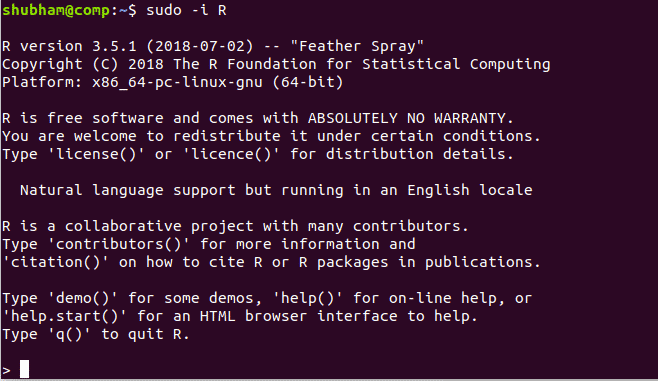We will start by installing the R programming language on Ubuntu 18.04 and continue with a very simple program in this language. Let’s get started.
Add GPG Keys
We first need to add the relevant GPG keys:
Here is what we get back with this command:
Add R Repositories
We can now add R repositories for the R programming language release:
Here is what we get back with this command:
Update Package List
Let’s update Ubuntu Package list:
Install R
We can finally install R programming language now:
Verify Installation
Run the following command to verify your install:
We will see the R console once we write above command:
Start using R programming with Hello World
Once we have an active installation for the R programming language on Ubuntu 18.04, we will start using it in a very simple and traditional “Hello World” program here. To execute a simple program, we can simply open a terminal, type the following command to open R console:
We can now start writing simple statements in the console now:
> print (helloLinuxHint)
Here is what we get back with this command:
Running R-based scripts
It is also possible to run R-based scripts using the R command line tool. To do this, make a new file ‘linuxhint.R’ with the following content:
print(helloLinuxHint)
Here is what we get back with a command which will run this script:
Here is the command we used:
At last, we will demonstrate another simple program to calculate factorial of a number with R. Here is a sample program which shows how to do this:
factorial = 1
# check if the number is negative, positive or zero
if(num < 0) {
print("Sorry, number cannot be negative.")
} else if(num == 0) {
print("The factorial of 0 is 1.")
} else {
for(i in 1:number) {
factorial = factorial * i
}
print(paste("The factorial of", num ,"is:",factorial))
}
We can run the above script with the following command:
Once we run the provided script, we can see the factorial calculated for a given number:
Now, you're ready to write your own R programs.
Python vs R for Data Science
If you are a beginner, it is difficult to pick Python or R over each other for data analysis and visualisation. Both of these languages have a lot of common libraries than you can imagine. Almost each and every task can be done in both of these languages, may it be related to data wrangling, engineering, feature selection web scrapping, app and so on. Some points we can consider for Python include:
- Python is a language to deploy and implement machine learning at a large-scale
- The code in Python is much more scalable and maintainable
- Most of the data science job can be done with five Python libraries: Numpy, Pandas, Scipy, Scikit-learn and Seaborn and they have developed majorly over past few hours and is catching up with the R programming language
Some things which make R more useful is the availability of many statistical products which creates excellent output for business use-cases which we will discover in coming posts.
Conclusion: Installing R on Ubuntu 18.04
In this lesson, we studied how we can install and start using the R programming language on Ubuntu 18.04 with very simple programs in the language. This is just a very simple introduction of many lessons to come with the R programming language. Share your feedback for the lesson with me or to LinuxHint Twitter handle.







